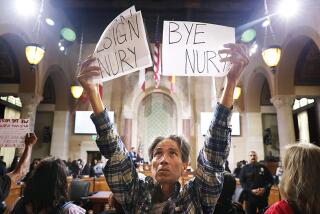Preservation Law Would Give Group Historic Role : Moorpark: The advisory position of the city’s Historical Society in proposed ordinance is called too broad by some council members.
- Share via
The Moorpark City Council will consider adopting a historic preservation ordinance tonight, but some council members are already objecting to the role granted the city’s Historical Society in the proposed law.
Under terms of the ordinance approved by the Planning Commission last month, the Moorpark Historical Society would serve as an official adviser to the city on applications for historic preservation.
Councilman Scott Montgomery said Tuesday that while he would welcome the comments from the society on such matters, he opposes writing the private, nonprofit group into a city law.
That would be tantamount to soliciting an environmental group’s suggestions before making a decision on an environmental impact report, Montgomery said. “I definitely want Historical Society input on any of these applications and I think that the Planning Commission would as well, but to codify it and make them quasi-governmental may be inappropriate.”
Councilman John Wozniak agreed, saying that such a formal association between the city and private group would not only be ill-advised, it would also add another level of bureaucracy to the preservation process.
“I’m not sure you want them written into a law,” Wozniak said. “Why is that necessary?”
Mayor Paul Lawrason, who is a member of the society and whose wife, Connie, serves as its president, said it is necessary because the group is the best source of historical guidance to the city. “This is an organization that was developed in the city to do and support just some of the things that this ordinance was designed to do,” he said.
Connie Lawrason said an official partnership between the city and society is the best way to ensure that Moorpark structures with historic significance are identified and preserved.
“It would be wise to have an official consultant who knows what the hell is going on here in the city,” she said. “We’re not a governmental agency. All we would be is an advisory panel and nothing more.”
Under terms of the proposed ordinance, applications for historic designation would be filed with the city’s Department of Community Development.
The application would then be sent to the Historical Society for review.
The society would return written comments to the city or directly address the Planning Commission, which would be designated the city’s Historic Preservation Commission.
Once a building received historical designation, its exterior could not be altered without a city permit.
Owners also would be required to maintain the building.
The council will discuss the ordinance at its meeting beginning at 7 p.m. in Moorpark City Hall, 799 Moorpark Ave.
Jim Aguilera, the city’s director of community development, said that Historical Society comment is appropriate, and said his agency tailored the ordinance to allow the group to provide information but not directly take part in any decision.
“We were very careful not to give the society any authority, that’s the key. The society has no authority over the city,” Aguilera said. “We are merely requesting their input in a formal manner, rather than an informal manner.”
Montgomery said the manner may be formal enough that society members could be obliged to submit the same financial disclosure statements currently demanded of other appointed and elected city officials.
“It would make them semi-public officials,” he said.
The councilman also questioned an aspect of the proposed law that would send all Planning Commission decisions on historic preservation to the council for final review.
“Let’s give them final approval and not review every single decision,” Montgomery said, adding that anyone unhappy with the outcome of a Planning Commission hearing could appeal the matter to the council.
Wozniak agreed that it would be unnecessary for each application to go to the council.
“You definitely don’t need to have the City Council making every decision,” he said. “The decision of the Planning Commission is appealable, if that needs to be done, but the Planning Commission ought to be able to sit there and make a decision based on the facts that they have before them.”
But Lawrason said that deciding whether or not to declare a structure of historic significance was important enough to merit council review in every case.
“For this sort of thing, which has very long-term impacts, I think it’s appropriate,” he said.
More to Read
Sign up for Essential California
The most important California stories and recommendations in your inbox every morning.
You may occasionally receive promotional content from the Los Angeles Times.










